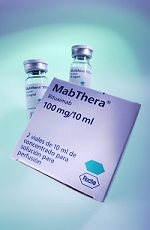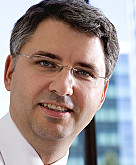
Roche ($RHHBY) counts on its tried-and-true cancer drugs Rituxan, Avastin and Herceptin to bring home the bacon, and the meds did not disappoint in 2015. But despite the drugs' strong performance, Roche still missed on profits last year, disheartening news for the company as it readies itself for biosimilar competition to some of its top sellers.
Strong performances for some of Roche's cancer meds bolstered sales, the company said in a statement. Rituxan, which is also sold as MabThera, brought in 7 billion francs, Avastin hauled in 6.6 billion francs and Herceptin came in close behind, chipping in 6.5 billion francs last year. Overall, the company's "major products were all broadly in line with expectations," Jefferies analyst Jeffrey Holford told Reuters.
 |
| Roche CEO Severin Schwan |
Roche is counting on a new generation of meds to keep delivering once biosimilar competition to its bestsellers comes knocking. And they'll come knocking sooner rather than later. The first copies of Rituxan, Avastin and Herceptin are expected by the end of 2017, and U.S. biosimilars will make an appearance after 2019, Roche CEO Severin Schwan said last year.
The company could get some help from a newer cancer drug, Perjeta. The HER2-positive breast cancer med charted 61% growth last year, bringing in 1.4 billion francs for the company. Perjeta also helped boost Herceptin numbers because the two drugs are given together. Herceptin sales shot up 10% last year.
Roche also has high hopes for newcomer Kadcyla, which brought in 769 million francs last year--a 51% jump. But the company faced a setback late last year after the drug flunked a Phase III trial for stomach cancer, putting a dent in Roche's plans to get the med approved for gastric cancer.
And recent FDA approval for Roche's combo melanoma drug, Cotellic (cobimetinib), could also pitch in positive numbers. The drug is used alongside the company's Zelboraf to treat patients with BRAF V600-mutation-positive advanced melanoma. Some analysts peg peak forecasts of the drug at $700 million-plus.
Still, Roche doesn't want to pigeonhole itself in cancer and has big plans to diversify outside its top three sellers. The company wants to launch up to 8 new drugs over the next 3 years, "an unprecedented number for Roche," Schwan told Reuters.
Roche is already making progress in MS. The company is readying its experimental MS drug, ocrelizumab, for FDA submission. When all is said and done, the drug could bring in 2.5 billion francs by 2020, according to some analysts' estimates.
The company also wants to build an immuno-oncology powerhouse with its PD-L1 treatment, atezolizumab. Roche recently submitted atezolizumab for approval for bladder cancer and is eyeing another approval for the drug for lung cancer. The company will be third to market with the med behind Merck's ($MRK) Keytruda and Bristol-Myers Squibb's ($BMY) Opdivo, which already have their own fierce rivalry.
Overall, the Swiss drugmaker tallied 48.1 billion Swiss francs ($47.3 billion) in sales in 2015, falling in line with analysts' estimates of 48 billion francs. But earnings excluding some items dropped to 13.49 Swiss francs a share from 14.29 francs in 2014, missing the Street's prediction of 14.01 a share. Roche blamed the miss on higher taxes, saying that its tax rate increased last year because it brought in more earnings from countries with higher levies such as the U.S.
- here's Roche's statement
- get the Reuters story
- and here's Bloomberg's take
Special Reports: The top 15 pharma companies by 2014 revenue - Roche | Top 10 best-selling cancer drugs of 2013 – Avastin – Rituxan/MabThera - Herceptin